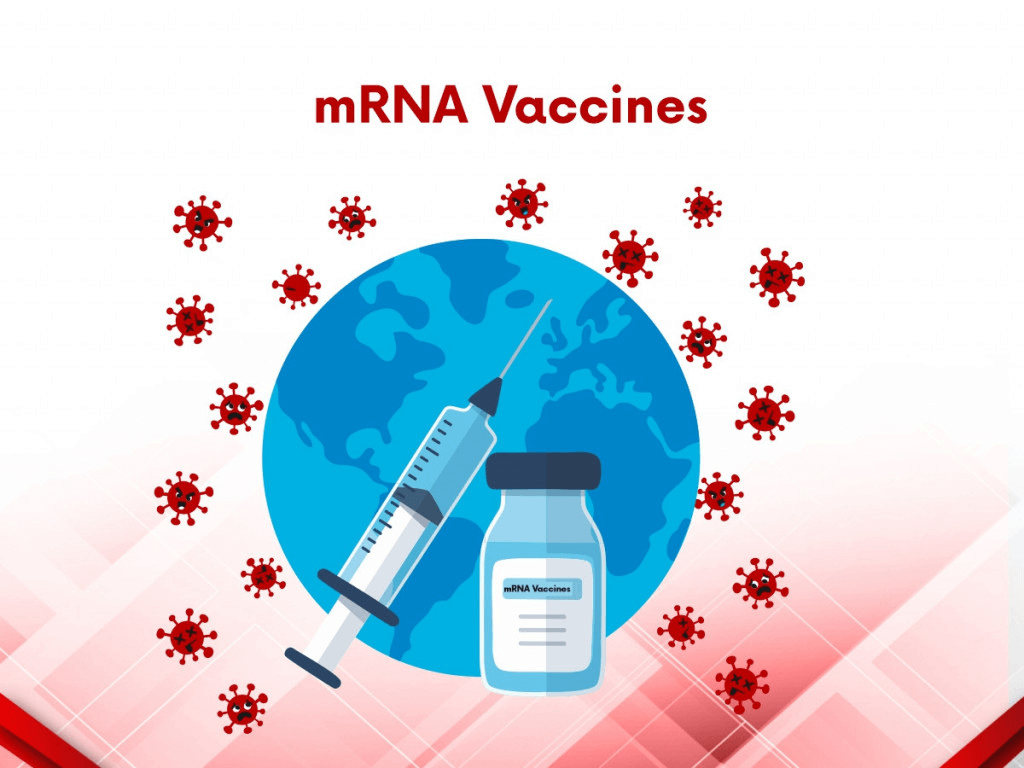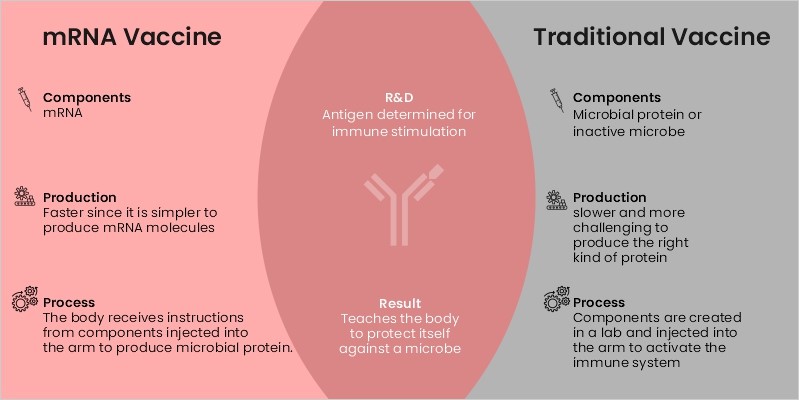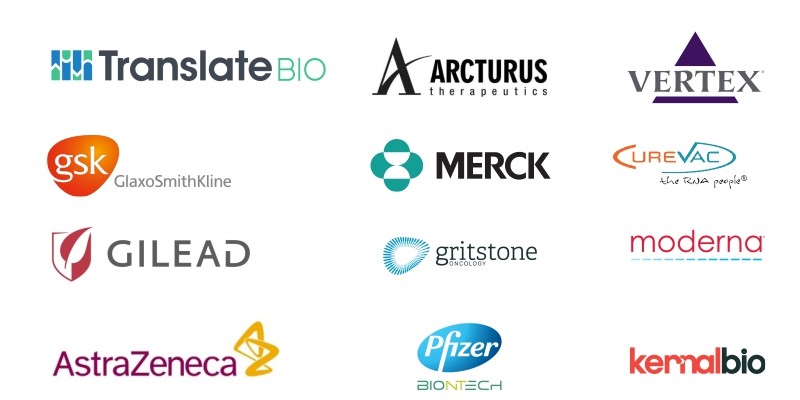
Close


Every year, vaccines prevent millions of diseases and save countless lives.
Vaccines provide the body immunity to resist diseases caused by the invasion of foreign particles (like viruses, bacteria, or any other pathogen). Traditional vaccines typically contain an attenuated or dead form of the pathogen, which stimulates the body to view it as a threat and generate an effective immune response against it.
Among the several vaccines that are administered, one is the mRNA or RNA vaccine. Instead of using the entire pathogen, this novel vaccine uses nucleic acid RNA. Although the scientific research behind these vaccines has existed for many years, they have only recently become available to the public.
In recent years, advancements in technology and increased investment in research have made mRNA an effective therapeutic tool in vaccine development. Because of their great potency, capacity for rapid development, and potential for low-cost manufacturing and safe administration, mRNA vaccines could be a viable alternative to traditional vaccine approaches.
The discovery of mRNA was made in the 1960s by François Jacob and Jacques Monod, who were awarded the Nobel Prize in Physiology or Medicine for their work. Since then, scientists have been studying mRNA due to its potential for treating various diseases.
Your body already has messenger RNA (mRNA). It carries instructions that tell your cells what to do, or a “message.”
In other words, messenger RNA, or mRNA, is a molecule that carries the instructions that instruct the cells to use their natural machinery to make proteins.
mRNA travels inside a protective bubble known as a Lipid Nanoparticle that allows it to enter cells smoothly. Once inside, our cells read the mRNA as a set of instructions, building proteins that match up with parts of the pathogen called antigens. The immune system recognizes these foreign antigens as invaders, mobilizing defenders known as antibodies and T cells and preparing the immune system for potential future attacks. So, when the actual virus arrives, the immune system may identify it, triggering an alarm to assist in fighting against infection and sickness.
For efficient entry into cells, mRNA is encased in a protective lipid nanoparticle. After entering the cell, the mRNA instructions are read, leading to the creation of proteins that align with pathogenic antigens. These foreign antigens are perceived as threats by the immune system, activating defences such as antibodies and T-cells. This helps train the immune system to respond more effectively in the event of a future infection. In this way, if the actual virus appears, the body will recognize it and respond with a defence mechanism to prevent diseases.
The COVID-19 vaccinations brought mRNA technology to the attention of many people; however, it is not a recent development in science. To unleash mRNA’s potential for disease prevention and treatment, researchers have been studying it for decades. While the mRNA technology’s mode of operation is fairly simple inside cells, it gives instructions for the production of proteins—researchers have had to spend years developing technologies to make mRNA work in the real world. mRNA has proved to be a great platform for vaccine development (and potentially therapeutics), so that our cells can do the hard work of producing proteins, resulting in an immune response that helps us to protect from various diseases.
An important milestone in science was reached with the approval of the first COVID-19 vaccines based on mRNA, establishing mRNA as a flexible and adaptable technology. The intensive efforts by Pfizer and BioNTech in the development of their COVID-19 vaccine resulted in a tremendous amount of scientific insight and knowledge in a short period of just one year.
The ability of mRNA vaccines to elicit a strong immune response makes them suitable for handling pandemics and epidemics. Their accuracy, effectiveness and the fact that they don’t require any nuclear integration have all contributed to the growth of mRNA vaccine technology.
mRNA vaccines are composed of artificial mRNA molecules that instruct the production of the antibodies that generates an immune response.
mRNA vaccines function by introducing a nucleic acid fragment (mRNA), which would then be translated into a protein associated with the infection. The mRNA used in these vaccines is a synthetic nucleic acid produced in the laboratory that elicits an immune response within the body, causing the immune system to generate antibodies. Antibodies are protective proteins in the body that aid in defending against harmful pathogens. Once produced, antibodies stay in the body for an extended period, and even if they are eliminated, the immune system generates memory cells that remember the information about the pathogen, leading to a more robust and efficient response during subsequent encounters.


The traditional approach to vaccination involves using microorganisms that have been weakened or inactivated to stimulate the immune system in our bodies, whereas mRNA vaccines include mRNA as an active ingredient that is used to provide instructions for the body to synthesize microbial protein. Subsequently, the antibodies produced by our immune system are activated to specifically target and eradicate the viral protein.
Moderna, BioNTech, Pfizer, Gritstone Oncology Inc, Translate Bio Inc, CureVac, GlaxoSmithKline, Gilead Sciences Inc, AstraZeneca Plc, Merck & Co, Vertex Pharmaceuticals Inc, Kernel Biologics, Arcturus Therapeutics Inc. are some of the top players in the mRNA vaccine field.

The healthcare industry experienced a revolution with the emergence of mRNA technology, which demonstrated great potential in effectively addressing the ongoing pandemic in practical applications.
To conclude, the future of mRNA vaccines is quite promising and holds great potential. mRNA vaccines are highly effective in protecting against various diseases and have been widely used in the fight against the COVID-19 pandemic.
With the increasing interest in mRNA technology and its potential benefits, researchers and pharmaceutical companies are exploring new ways to use mRNA vaccines to treat and prevent other diseases, such as cancer, influenza, and even neurodegenerative diseases.
Particularly in the fields of infectious disease and cancer, where traditional vaccinations fall short of producing the desired response, mRNA vaccines have a great deal of potential. Additionally, advancements in lipid nanoparticle formulations for the delivery of mRNA into the body are contributing to a positive outlook for the growth of the market.
mRNA vaccines and treatments hold the promise of being used to treat diseases that are currently incurable. Some of these diseases are already undergoing clinical trials. Compared to traditional medicines, mRNA vaccines and treatments are developed using advanced technologies, making them more effective against pathogens. They induce a stronger immune response, and are less expensive to produce.
Despite a number of challenges, including reactogenicity, immunity durability, mass production, and low-temperature storage of produced vaccines, the pandemic has helped mRNA vaccine technology progress.
Overall, the future outlook for mRNA vaccines is optimistic, with a growing body of evidence suggesting that this technology could play a major role in improving global health in the coming years.
Wissen Research is a company that offers research services on a worldwide scale to the Intellectual Property (IP) team, Research and Development (R&D) team, as well as decision-makers across different fields such as marketing and business development.
Wissen Research can provide comprehensive overviews of the technology and intellectual property for mRNA vaccines.
Our company is able assist businesses in gaining knowledge about industry advancements, strategic actions taken by key industry players, potential acquisition or partnership targets, unexplored areas in the field, prominent players with strong intellectual property portfolios, and other relevant information.
Furthermore, we can offer assistance with competitive intelligence, product benchmarking, and various other related services.
Authored by – Guniyal Bagga
Please Subscribe our news letter and get update.
© Copyright 2023 – Wissen Research All Rights Reserved.
Powered by VintageCoders